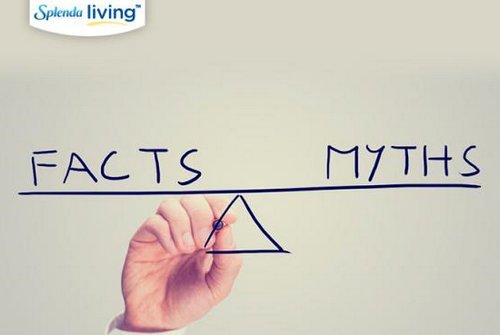What is Sucralose?
The simple answer is that it is sugar substitute which is artificially made. The reason it is used so often is for its non-caloric makeup. Sucralose it is not digested by the body and simply eliminated which is the reason it does not make calories in the body. There has been much controversy over Sucralose.
There is much information on the subject most of which is scientifically studied. Many people choose to continue to believe only one view even after seeing the evidence.
In this article, you will see both the positive and negatives noted without bias. (1)
 Photo Source : blog.splenda.com
Photo Source : blog.splenda.com
In this article, you will see prevented the ideas of sucralose as well as scientific review. The decision is always yours to make. This article is completely unbiased in its opinion of Sucralose.
Sucralose side effects
Sucralose has very few side effects. It was considered safe for human consumption by the FDA. With this in mind, it has been noted to cause side effects in some people. Most of the studies done that showed these side effects were done with very few patients involved which can lower the legitimacy of any medical study. The effects that were noted in these studies are as follows:
- Trigger for migraines
- Glucose transport issues
- Issues with weight stability
- Decreased effect of therapeutic medications
- Effects on intestinal bacteria.
Most studies and even the FDA agree with the statement that with excessive or habitual intake there is a risk of toxicity.(2,3)
Sucralose dangers
Sucralose has been declared safe by the FDA Food and Drug Administration in the United States. Here are a few facts to keep in mind:
- Most of the studies used to determine if sucralose was safe were actually looking for dangers and toxins.
- Very few studies showed only a small connection to obesity, diabetes, and cancer.
- It is known for not having the same bitter aftertaste as other sweeteners.
- It is actually found in many items ranging from soft drinks to chewing gum.
- The fact that it is found in chewing gum is due to the fact that it is not harmful to teeth.
- It is actually so sweet that sometimes it needs to be mixed with other caloric sweeteners to dull it a bit.
- Studies show no danger for diabetic patients. As well as multiple other studies which as shown very few dangers at all. (1,2,3,4)
 Picture 2 : Splenda
Picture 2 : Splenda
Image Source : symmetrydirectbuy.com
Uses of Sucralose:
Sucralose can be used for almost anything that regular sugar can be used for. It is also found in many foods that are processed and packaged. Some of the things that Sucralose can be used for are:
- Cooking
- Coffee
- Baking (1,2)

Photo 3 : Sucralose on the packaging of processed food
Figure Source : www.yumyucky.com
Sucralose vs Aspartame vs Stevia vs Aspartame vs Trivia
| Name: | Order of sweetness | Storage: | Safety | Brand names | Approval |
|---|---|---|---|---|---|
| Sucralose | 1 | Any temperature and PH condition | High | Splenda, Zerocal, Sukrana, SucraPlus, Candys, Cukren and Nevella | 1989 in the Us and considered a non-nutritive sweetener. |
| Acesulfame potassium | 2 | Not in hot temperature, or high PH | High | Sunset, Sweet One | |
| saccharin | 3 | Not in hot temperature, or high PH | High | SugarTwin, Swee’N Low | 1998 in European countries |
| Aspartame | 4 | Not in hot temperature, or high PH | High | Equal, NutraSweet, Canderel | Since 19080s in European countries |
| sucrose | 5 | Not in hot temperature, or high PH | High |
(1,2,5)
Aspartame side effects
Aspartame is now found in many of the processed foods bought and consumed daily. Although it got many bad reports in the 80s it has been found to be safe. With this in mind, there have been reports which suggest that aspartame causes various side effects.
This is not a comprehensive list but will show some of those side effects. This knowing that many of these side effects have been scientifically dis-proven.
- Brain tumors
- Increase in lymphomas and leukemia (2,6)
Other facts about Aspartame that are important are as follows:
- Food products which contain aspartame should show a warning about phenylalanine.
- The FDA approved consumption is 50 mg/kg.
The only real danger scientifically noted is for those who suffer from phenylketonuria (PKU). Basically, these people cannot properly digest phenylalanine and this causes build up and toxicity. It is a genetic disorder and its diagnosis is extremal rare.
This diagnosis is from birth most people are aware of it before adulthood. It is usually checked for in all babies in the United States.
The diagnosis is made by watching for the following symptoms:
- Intellectual issues
- Slow development
- Psychiatric issues
- Emotional and social dysfunction
- Neurologic issues
- Bone loss or lack of proper development
- Bad breath (6,7, 12,13)
In conclusion most evidences shows that Sucralose is safe and is well balanced as far as use and storage. Sucralose seems to be an excellent replacement for real sugar. It supposedly has no aftertaste and is very sweet.
The few side effects noted are rare and more so only in those with PKU. Sucralose as with any food or substance should be used in balance fashion to prevent the few side effects that may occur.
Always be sure to check with your doctor before using this substitute if you have underlying diagnosis.
References:
- https://en.wikipedia.org/wiki/Sucralose
- http://www.nhs.uk/Livewell/Goodfood/Pages/the-truth-about-sucralose.aspx
- https://www.ncbi.nlm.nih.gov/pmc/articles/PMC3856475/
- http://www.coca-colamexico.com.mx/historias/bienestar/mitos-y-realidades-de-los-edulcorantes-decidamos-bien-informados?gclid=CNz_9LS4uNICFYm6wAodMXUMGg
- https://en.wikipedia.org/wiki/Aspartame
- https://www.cancer.org/cancer/cancer-causes/aspartame.html
- http://www.healthline.com/health/aspartame-side-effects
- http://www.nhs.uk/Livewell/Goodfood/Pages/the-truth-about-aspartame.aspx
- https://sciencebasedmedicine.org/aspartame-truth-vs-fiction/
- http://www.medscape.com/viewarticle/860431
- http://www.medscape.com/viewarticle/840559
- http://www.mayoclinic.org/es-es/healthy-lifestyle/nutrition-and-healthy-eating/expert-answers/phenylalanine/faq-20058361
- http://www.mayoclinic.org/es-es/diseases-conditions/phenylketonuria/basics/definition/con-20026275
- http://www.mayoclinic.org/healthy-lifestyle/nutrition-and-healthy-eating/in-depth/artificial-sweeteners/art-20046936
- http://www.mayoclinic.org/es-es/diseases-conditions/diabetes/expert-answers/artificial-sweeteners/faq-20058038
- https://kidshealth.org/en/parents/sweeteners.html?ref=search
